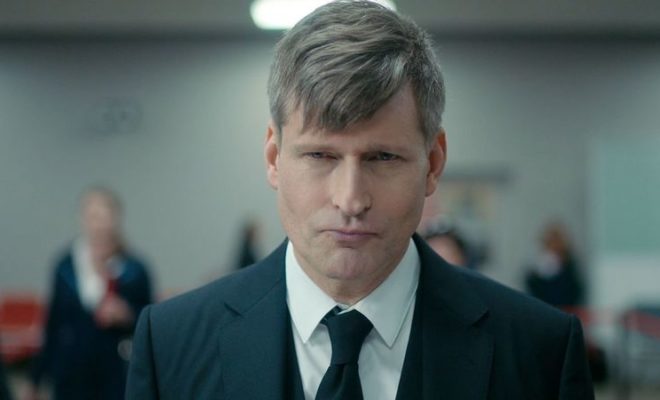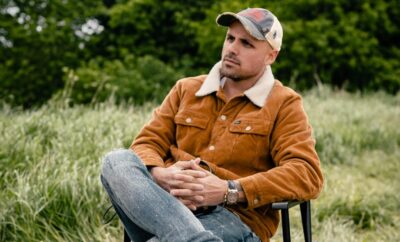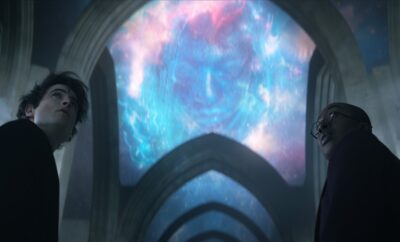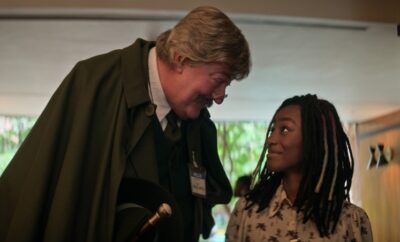
Interviews
Crispin Glover – Lucky Day
By: Lisa Steinberg
Q) Talk about the irony behind the film’s title Lucky Day.
A) Well, it depends on how you look at it. Somebody else was saying something about it and if you think about what you think the objective of the character Luc is doing, just after I utter that line…I don’t want to do a spoiler, but conceptually what the goal of my character is it is quite plausibly accomplished at that moment. The character, Luc, may not know if it is accomplished or not. The audience knows, but Luc may very well feel like the objective is obtained at that moment – meaning it’s a lucky day. Now, it’s possible as well that there may be some doubt, but there is a plausible chance that the objective would be completed.
Q) Luc is a French hitman seeking revenge against Red for the death of his brother. This would give the idea of him being the villain, but often times the “bad guy” never seems themselves in that way. They see themselves as wrong and doing something for the greater good. How does that area of gray play into the film?
A) I think it is very apparent and was written in the script that you can completely look at the character in a positive light. It would not be too far fetched to take certain movies that have a protagonist in corporately funded and distributed films that essentially have the same amount of carnage that gives the depth to it that they are the hero. It’s not too far-fetched to see it that way.
Q) Both people sort of feel they are the driving force of the film.
A) Sure, yeah. And that’s from the benefit of Roger’s [Avary] writing. Roger did a really good job with that. And I think part of the depth comes from that Roger was incarcerated. He was in jail when he wrote this and I think he was really digging deeply psychologically on multiple levels when he wrote the screenplay.
Q) To be able to play these double mindsets in sort of a “devil’s advocate” way is exceptional as well.
A) Right! It’s funny because when we did the scene at the end (which does become kind of emotional), it does play that my character’s emotional. Playing it had that quality. Roger said to me the character of Red (Luke Bracey) essentially represented himself and my character essentially represented his past coming back to haunt him. I think the fact that my character had an emotional quality to it that wasn’t necessarily written, (but getting to the truth of that character) Roger said it made him feel like…He’s, of course, arguing for his point of view, his own perspective, but he understood his past perhaps does have certain emotional hurt or whatever and he had to contend with that. It was interesting because I could see he was genuinely processing that.
Q) The relationship between Red and Luc is kind of a tet-a-tet. How did you work to play off one another?
A) Most of the scenes we’re not in together at all. There are a couple of scenes in the shooting gallery. That’s very distanced, especially the way he shoots – getting tight scenes. Then, I’m on the roof of the car at one point and that’s also quite distanced. So, really the only truly interactive scenes is that kind of climactic scene where it is revealed what really is the motivation. In that particular scene, it was very well written by Roger, but also the way that Luke played it I think he sensed the emotional aspect to what my character was going with and he played up on that. It was actually very helpful the way he nuanced it. There are slight improvisational aspects to it. It’s really very good. So, it was really good working with it.
Q) The cinematography added to the light and darkness to the film and the growing emotional throughout the film. How does that really play up the undertones of the film?
A) Also, I make my own films that I tour with. I’m going to have another film production ready for next year that I’ve been working on for many, many years. It’s the first time I’ve acted with my father, Bruce Glover. I own the camera equipment. I have a DP with me when I’m shooting my films. I am very aware of the lenses and the cameras. I have become even more aware since I edit my films as well (or at least co-edit). This makes you aware of lenses and camera work in a very technical way. So, I’m hyper aware of it as an actor. Yes, the framing and what lenses are being used for what scenes are critical. And it can make a difference in performance. The way something is actually framed or how a lens is used can make a big difference of how you play it. Now, technically when you’re trained as an actor, you are trained to not be aware of that. In fact, you are taught to not be thinking about anything other than the internal aspects. But that does not mean that it is not useful. It is useful to have an awareness. One can argue that it’s ideal to not be aware of those things at all and be completely immersed within the psychology of the character. I can agree with that, but there are definitely times when it’s basically imperative to have an awareness of it. And sometimes, especially as a filmmaker that is acting in their own film, I can become aware of a little too much solving problems externally with the camera lens as opposed to internally as an actor. But, none the less, Roger is aware of good lenses and framing. And our DP was excellent as well.
Q) You have taken on a number of diverse and compelling innateness to them. What really draws you or connects to you to the characters that we play?
A) A lot of it ends up being coincidence, as opposed to an overarching plot for me. There are things that I am attracted to and interested in. I’ve known Roger since the 90’s, even before I worked with him on Beowulf at parties and stuff. We had always talked and gotten along very well. Roger co-wrote Beowulf with Neil Gaiman for Roger to direct, but Zemeckis got ahold of the screenplay and he wanted to direct it. So, Roger was paid for the screenplay. And Zemeckis said to Roger and Neil (and of course I’m working with Neil now on “American Gods,” which he wrote the beautiful books that the show is based on and he’s the EP of the show) that he would cast the people that they had wanted to play the characters. I was the person that they wanted to have play Grendel. For me, there had been a lawsuit because of what happened in the sequel to Back to the Future where they took the mold of my face they had made for the old age for the first film and made prosthetics and then applied that to a different actor in order to fool audiences into thinking I was in the second film. That is, of course, illegal. It was not a good thing to have happened. It’s disturbing because even to this day, after all this year, people sometimes don’t realize that I was not the actor in the second film. So, there are rules in the Screen Actor’s Guild that make it so that can’t ever happen again. Even without the precedence of my lawsuit, it was always illegal. It wasn’t like my lawsuit made it so it was illegal. What they did was stealing. So, I never thought I would work with Zemeckis again. But I’m grateful to both Roger, Avery and Neil Gaiman because I did end up having a very positive working with relationship again with Zemeckis playing Grendel in Beowulf. It did help to have a salve on…That was not a fun thing to have happened on the sequel to Back to the Future. In any case, I was touring with my shows…I think I had just come back from the Czech Republic and Roger I think had just emailed me right when I’d got off a plane. Time was coming down to shooting and he did not have the actor to play the character. In fact, my father teaches acting. For some reason Roger didn’t have my phone number and so he called my father. My father said, “If Crispin doesn’t play the character, I’ll play it.” [laughs] As soon as I read the character it was obviously a great part. I was shooting within seven days playing the character. So, it was actually a short time for preparation. Roger didn’t write this character specifically for me. Often writers will have someone in mind, but if he did, I don’t know who it was. But he did say it wasn’t something specifically written for me. Early in my career some of the characters that I played were not necessarily written as eccentric characters and I brought a certain kind of perhaps eccentricity to them. What tended toward happening is often getting cast then in characters that are written to be an eccentric character (which actually, for me, probably often is not really good as if I were given a character really…) It’s less about a character that is eccentric and more about just if it is a character that has depth. If a character has depth, then I can ideally get to the truth of the character and the truthful psychology of this character. That was what was in the situation with this part. This was a character that had a complexity in the psychology. So, I was able to get into that. That would be the ideal. Every single character that I played was very well written and had complexity to it. Luckily, this one does. I’m looking forward to seeing what peoples’ reactions will be to it. I feel good about it.





You must be logged in to post a comment Login